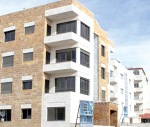You are here
30,000 domestic helpers in Jordan are ‘irregular’ — study
By Laila Azzeh - Dec 22,2015 - Last updated at Dec 22,2015
In Jordan, there are around 50,000 legal domestic workers, while the number of irregular household helpers is 30,000, according to a recent study
AMMAN — After coming to Jordan with hopes for a better life, domestic helpers face many violations that threaten their wellbeing, according to a recent study.
Although efforts to protect domestic helpers have resulted in substantial legislative reforms in recruitment regulations, workers’ access to basic human rights and protection is “still lacking”, showed the study, conducted by Tamkeen Fields of Aid.
In Jordan, there are around 50,000 legal domestic workers, while the number of irregular household helpers reaches 30,000, as highlighted by the study, titled “Invisible Women: The Working and Living Conditions of Irregular Migrant Domestic Workers in Jordan”.
“Migrant domestic workers — mainly women — from Sri Lanka, Bangladesh, Indonesia and the Philippines, are... one of the largest groups of workers excluded from labour and social protection in Jordan,” the report said.
“This study is different from any other conducted on the same subject in its ability to shed light on the social aspects of domestic workers, their everyday life, educational level and marital status,” Tamkeen Executive Director Linda Kalash told The Jordan Times on Monday.
Of the main findings of the study, based on several methodologies, mainly interviews, domestic workers’ ignorance of their rights was the most evident, according to Kalash.
“Respondents who receive their salaries on time described their situation as being very good although it was obvious in their answers to other questions that they lacked basic rights and decent treatment,” she noted.
Many workers are deprived of basic needs such as food and leisure time, and the chance to contact their families.
Many of them are also exposed to physical, verbal and sexual abuse, the study said Many employers and recruitment agencies take advantage of migrant domestic helpers by confiscating their passports and other legal documents, including work and residency permits, it added.
It also indicated that the majority of workers knew that they were going to work as domestic helpers, but they did not know the extent of hard work required from them.
Some workers said that they expected their tasks to be limited to cleaning the house, and not involve additional duties such as childcare and gardening, or to be asked to work for more than one house without their consent.
Concerning wages, 38.7 per cent of the helpers surveyed do not receive their salary on a regular basis, while it is also common for workers not to be paid at all as their employers cheat them by promising to pay all salaries at once at the end of the contract.
“However, once the contract expires, they refuse to pay her the due amount. In the worst case, employers refuse to pay several years of a worker’s salary,” said the study. Around 23 per cent of the interviewees said they encountered physical and/or sexual abuse in the workplace.
Verbal abuse is also very common: 39 per cent of domestic workers stated that they had been subjected to it. In addition, 11.3 per cent of domestic workers testified to injuries that have caused serious physical and health consequences Focusing on the social situation of workers, the study maintained that the educational level of those in Jordan ranges between elementary and higher education, while there are a few with no education.
However, the level of education is “uneven” from one nationality to another and that there is a connection between violations and the level of education “The lower the education level of the worker, the more violations she is subjected to at the workplace and vice versa. This is due to their ignorance of their legal rights, and their fear of going out and spending time with their friends outside the house,” said the study.
The average age of the 303 women who were interviewed is 35.6, and the average number of working years in Jordan is 3.3 years, according to the study, which was two years in the making.
“The interviews were the most difficult part of the study for it took time and efforts to reach out to the workers and convince them to speak to us,” noted Kalash. Most irregular domestic workers, she said, are unregistered in the formal labour sector, a reality that “amplifies the risk of their exploitation and blocks their access to justice”.
Government pressure to crack down on the growing phenomenon of irregular migration in Jordan and the fear of deportation have left a group that already works in private households further isolated from the public eye, according to the study.
It added that “many women workers are afraid they will encounter police officials demanding legal documents... and choose to stay in the workplace or in their homes” to avoid that.
Of the interviewed sample, very few workers mentioned that they have their children living with them in Jordan, with many of them being elderly people who have been working in Jordan for years.
The workers who have their children living with them are usually married to Jordanian men, while the children of other irregular migrant workers are stateless, and therefore deprived of their most basic rights. These were born in Jordan outside “ordinary” wedlock. The research team met five families who face such difficulties.
Most of the interviewed women who were married come from conservative communities in Sri Lanka, Bangladesh and Indonesia that usually put pressure on women to get married and have children at an early age.
“Quite a few workers who were interviewed confirmed facing problems with their husbands, and they asserted that their work abroad gave them independence from them,” the report said, but the women also said that the distance has affected their relationships with their husbands.
The study criticised laws that “criminalise running away from the workplace”, which might lead to exacerbating the ill treatment some domestic helpers face.
The recommendations included establishing a private entity that employs domestic helpers on a parttime basis without requiring them to stay at the employer’s house, abolishing the sponsorship system, training workers before their arrival to Jordan and reviewing antihuman trafficking regulations to ensure they are in line with international standards.















